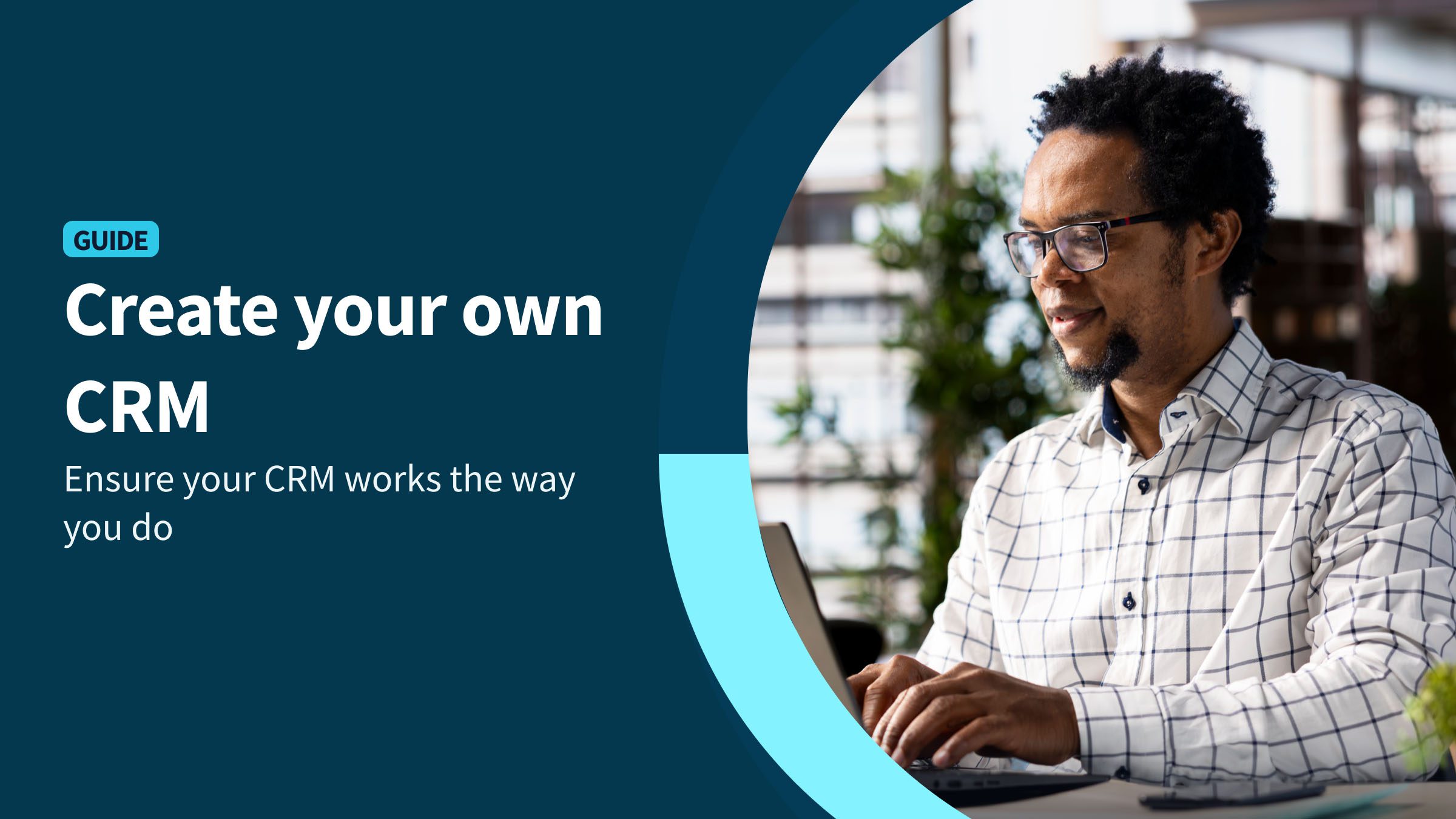As your roofing business grows, so does the complexity. Managing multiple crews, quotes, materials, and deadlines using spreadsheets, whiteboards, or disconnected tools creates gaps—gaps that cost time, money, and customer trust.
To avoid inefficiencies, roofing contractors can turn to specialized CRM software to stay organized and drive profitability through smarter automation, tighter integration, and real-time visibility across the entire workflow.
Here at Method CRM, we’ve helped thousands of QuickBooks-based businesses break free from manual processes and scale successfully. Our platform offers two-way QuickBooks sync, end-to-end workflow automation, and CRM tools designed to mold your business, not force you to change how you work.
In this guide, we’ll help you:
• Understand what makes a roofing CRM truly effective.
• Compare the top platforms on features, pricing, and fit.
• Learn how to select the right tool for your stage of growth.
Designed for everyone from small crews looking to modernize to growing roofing companies ready to scale, this guide is your blueprint for making a smarter CRM choice and getting back to what you do best. 🏠👷♂️🔨🙌
Table of Contents
Why roofing businesses need a specialized CRM 👨🏻💻
Behind every successful roofing business is a maze of quotes, schedules, work orders, invoices, and follow-ups. When these moving parts live in different systems or, worse, on pen and paper, things can fall apart fast. Roofers need more than a basic CRM. They need one built for the way they actually work.
From spreadsheets to a centralized system
Many roofing businesses start with a patchwork of spreadsheets, sticky notes, whiteboards, and siloed tools. While this approach can work in the early days, it can quickly break down as your operations grow. Projects can overlap, leads can fall through the cracks, and miscommunication can become costly.
A specialized roofing CRM solves these problems by bringing everything into one place. With Method, you can centralize your customer database, estimates, scheduling, work orders, and invoicing. Instead of juggling multiple systems or chasing down updates, your team can rely on one streamlined workspace built for roofing workflows.
This shift from manual to digital not only saves time but also builds consistency across every job, making it easier to deliver high-quality service and scale operations smoothly.
Mobile and QuickBooks sync for seamless operations
Roofing companies don’t only operate from behind a desk. Your team is on the road and in the field, so your CRM needs to move with them.
Method’s real-time, two-way QuickBooks sync eliminates the need to enter the same data twice. Estimates, payments, and invoices automatically update across systems, reducing errors and saving hours each week.
Further, Method’s mobile app empowers field staff to create and send estimates, capture signatures, update job details, and manage invoices right from the job site. That means faster turnarounds, better customer experiences, and fewer delays between work done and payments received.
Automation and real-time visibility enhance profitability
When you’re managing multiple roofing projects, it’s easy for things to slip through the cracks. Whether it’s forgetting to follow up on a proposal or delaying an invoice, every missed step affects your cash flow and customer relationships.
With Method, you can automate key actions like sending proposal reminders, generating invoices, and notifying clients about job updates. These automated workflows keep everything moving without needing constant manual input from your team.
In addition, real-time dashboards give you instant visibility into job status, team productivity, and profit margins. You can spot bottlenecks, address issues early, and make more informed business decisions based on live data rather than assumptions.
In turn, you get a more responsive, efficient, and profitable roofing business built on a CRM designed for the way you work.
How to choose the best roofing CRM 🥇
Picking the right CRM for your roofing business comes down to more than features. The best tool should support your day-to-day work, improve your team’s efficiency, and keep your jobs and clients on track. Here’s what to consider.
Automation and workflow capabilities
Look for a CRM that automates key tasks like proposals, follow-ups, invoicing, and task reminders. With so many tasks off the manual to-do list, sales teams and project managers can focus on work that brings in revenue, not repetitive admin.
The best systems let you build custom workflows that reflect how your business runs, without needing a developer.
Integration ecosystem
Your CRM should connect with the tools you already use. If your business runs on QuickBooks, the right QuickBooks integration is essential for seamless invoicing and financial tracking.
Roofing-specific tools like EagleView, Roofr Reports, CompanyCam, and supplier networks should also integrate easily so data flows across your entire operation without manual entry.
All-in-one vs modular strategy
All-in-one CRMs include everything from sales, scheduling, invoicing, and communication in one platform. They’re easier to manage and often more cost-effective.
Modular systems let you pick best-in-class tools for each job, but managing multiple platforms can be complex and costly if they don’t sync well.
Mobile access and field usability
Roofing teams are always on site. This means your CRM must have a reliable mobile app that lets field staff send estimates, upload photos, and track jobs in real time.
Mobile access keeps everyone in sync and helps teams respond quickly to changes or delays.
Pricing and ROI
Check the pricing model to see whether it’s per user, per feature, or flat rate. More importantly, consider the return on investment.
A good CRM saves time, improves cash flow, and increases profit margins. Look for free trials or demos to test ease of use and setup support before committing.
Leading roofing CRM platforms compared ⚖️
When you’re ready to choose a roofing CRM, you’ll want to see how each platform stacks up in terms of features, flexibility, and fit for your business size. Here’s a breakdown of the top CRM solutions for roofers.
Method Field Services
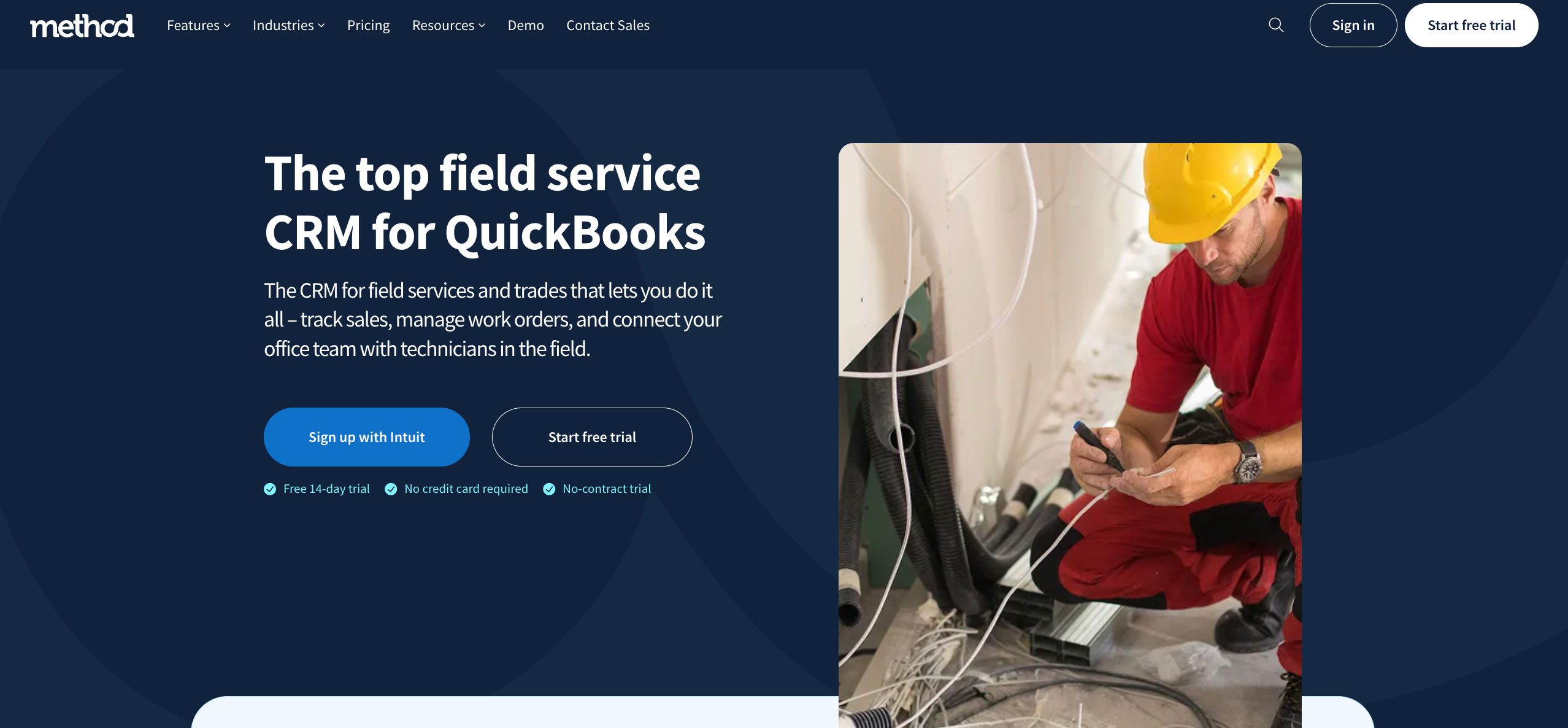
Overview and key features: Method is a fully customizable CRM designed for QuickBooks users. It combines sales, scheduling, project management, and customer communication into one streamlined platform with a real-time, two-way QuickBooks integration at its core.
Best for: Roofing companies that want software tailored to their workflow, not the other way around.
Pros
- Syncs instantly with QuickBooks for estimates, invoices, and payments
- Provides real-time access to job status and customer updates
- Fills in the gaps QuickBooks doesn’t cover including work orders, jobs, crews, or customer interactions
- Gives your team access to custom dashboards, fields, and workflows built for roofers
- Allows your team to efficiently track projects and schedule jobs
- Automates your workflow from quote to payment, speeding up quoting, scheduling, approvals, invoicing, and follow-ups
- Provides hands-on onboarding and support
- Scales with your growing team
Cons
- Only available for QuickBooks or Xero users
Why it stands out: Unlike other CRMs that require you to adapt your processes, Method adapts to you, offering end-to-end automation for roofers who want full control without the complexity of enterprise software.
AccuLynx
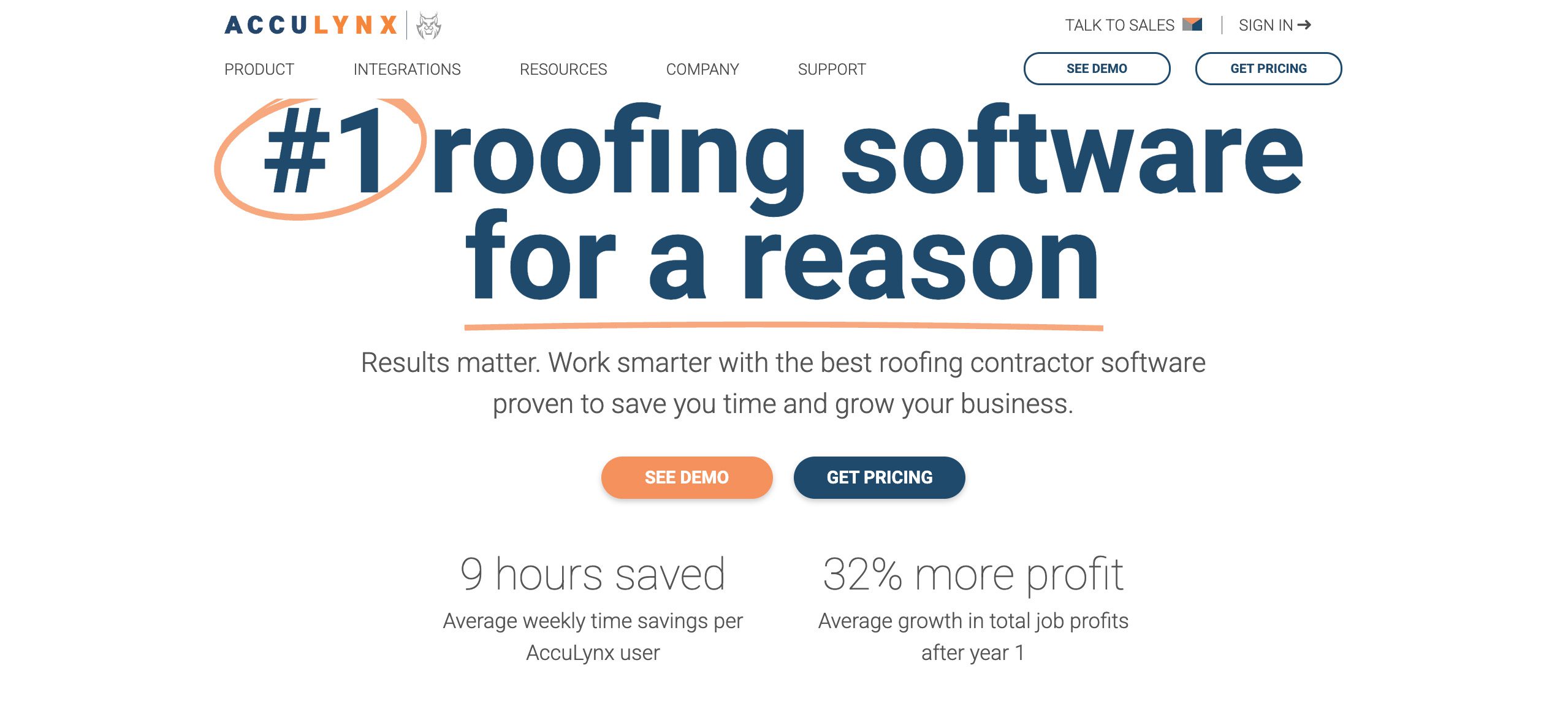
Overview and key features: AccuLynx is an all-in-one platform built specifically for the roofing industry, with integrated aerial measurements, supplier catalogues, and production tools.
Best for: Mid-sized to large roofing teams managing full-scale operations from lead to production.
Pros
- Visual scheduling with drag-and-drop calendars
- Supplier ordering and catalogue integration
- Built-in aerial measurement tools
Cons
- Higher price point
- Less flexibility if your workflow is non-standard
JobNimbus
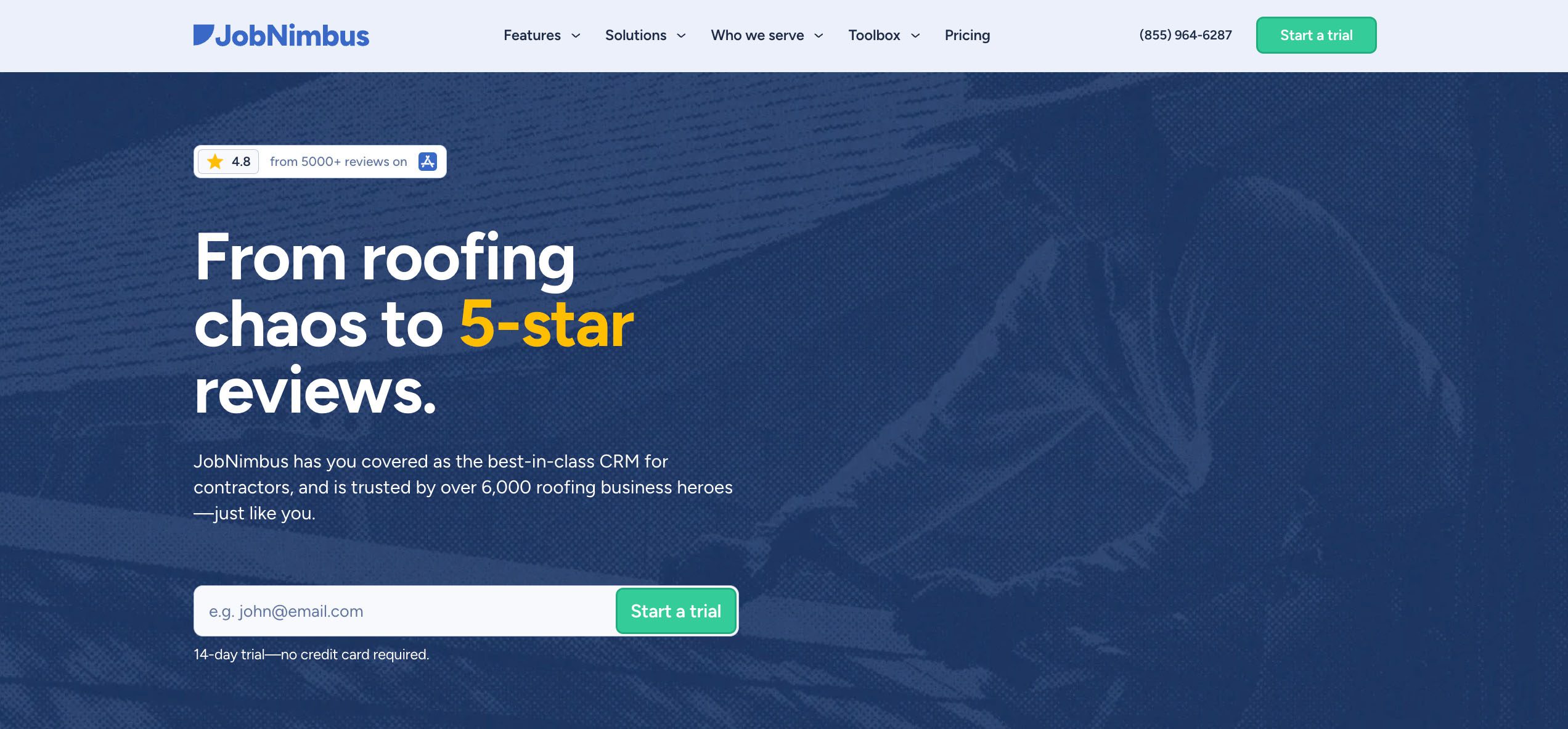
Overview and key features: JobNimbus is a flexible, visual CRM with mobile access and integrations for roofing contractors.
Best for: Contractors who want visual project boards and custom workflows.
Pros
- Kanban-style task boards
- Custom workflows and fields
- Integrations with financing and payment tools
Cons
- Occasional data duplication
- Reporting is less advanced than other platforms
Roofr
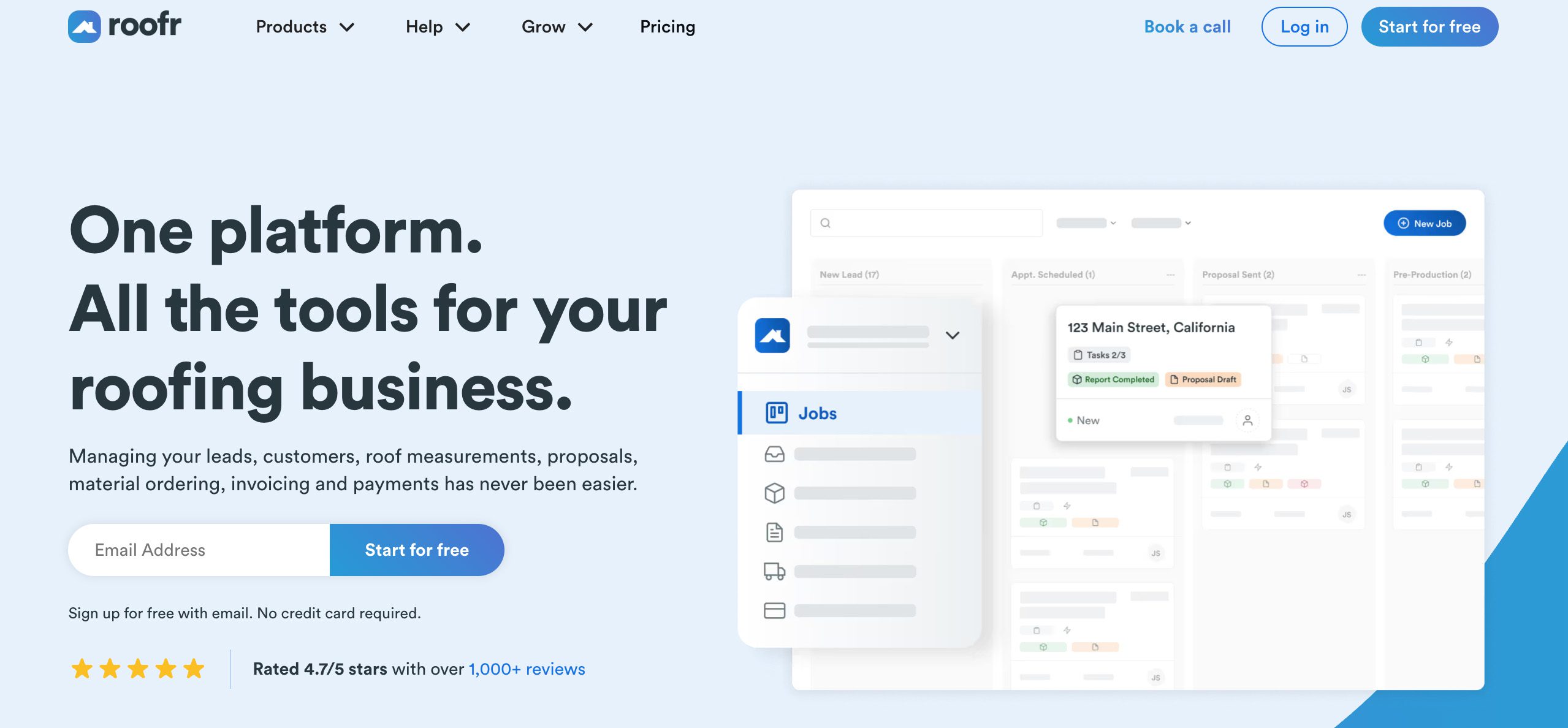
Overview and key features: Roofr focuses on fast roof measurements and polished proposals, with e-signature support and instant reports.
Best for: Small to medium teams that need rapid estimating and client-friendly proposals.
Pros
- Instant measurement reports
- Professional proposals with e-signatures
- Transparent pricing
Cons
- Limited operations or production features
RoofLink
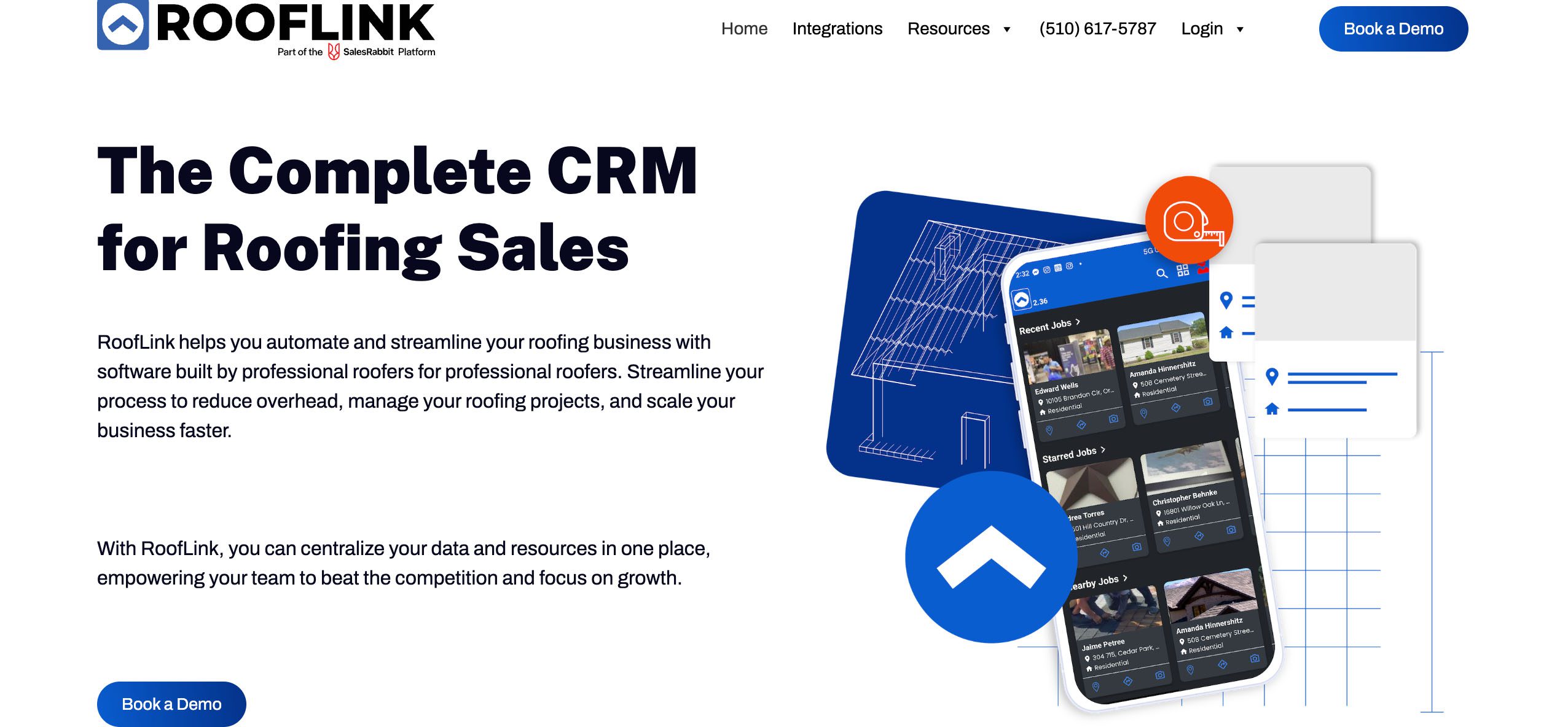
Overview and key features: RoofLink is a flat-rate CRM with tools for profitability tracking, storm response, and door-to-door canvassing.
Best for: Teams working in storm restoration or heavy canvassing environments.
Pros
- Weather tracking and real-time job profitability
- Digital canvassing tools
- QuickBooks and Stripe integrations
Cons
- Fewer customization options
- Still gaining traction in the market
Leap CRM
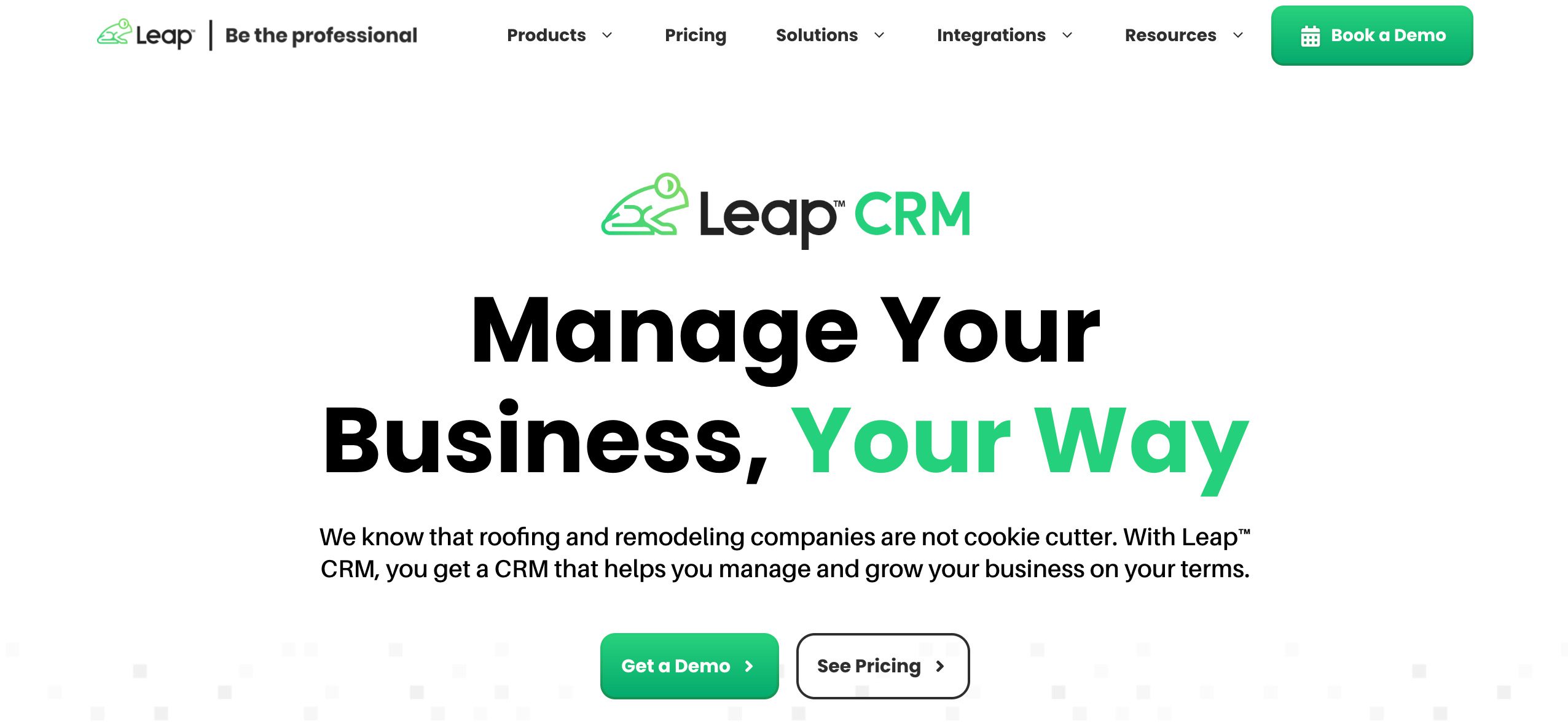
Overview and key features: Leap CRM, formerly known as JobProgress, is a contractor-focused CRM that supports the entire customer journey from lead to invoice.
Best for: Roofing businesses that want everything in one place.
Pros
- Estimating and contract tools
- Workflow automation and e-signatures
- Built-in payment processing
Cons
- Can feel cluttered
- Mobile app could be more intuitive
Spotio
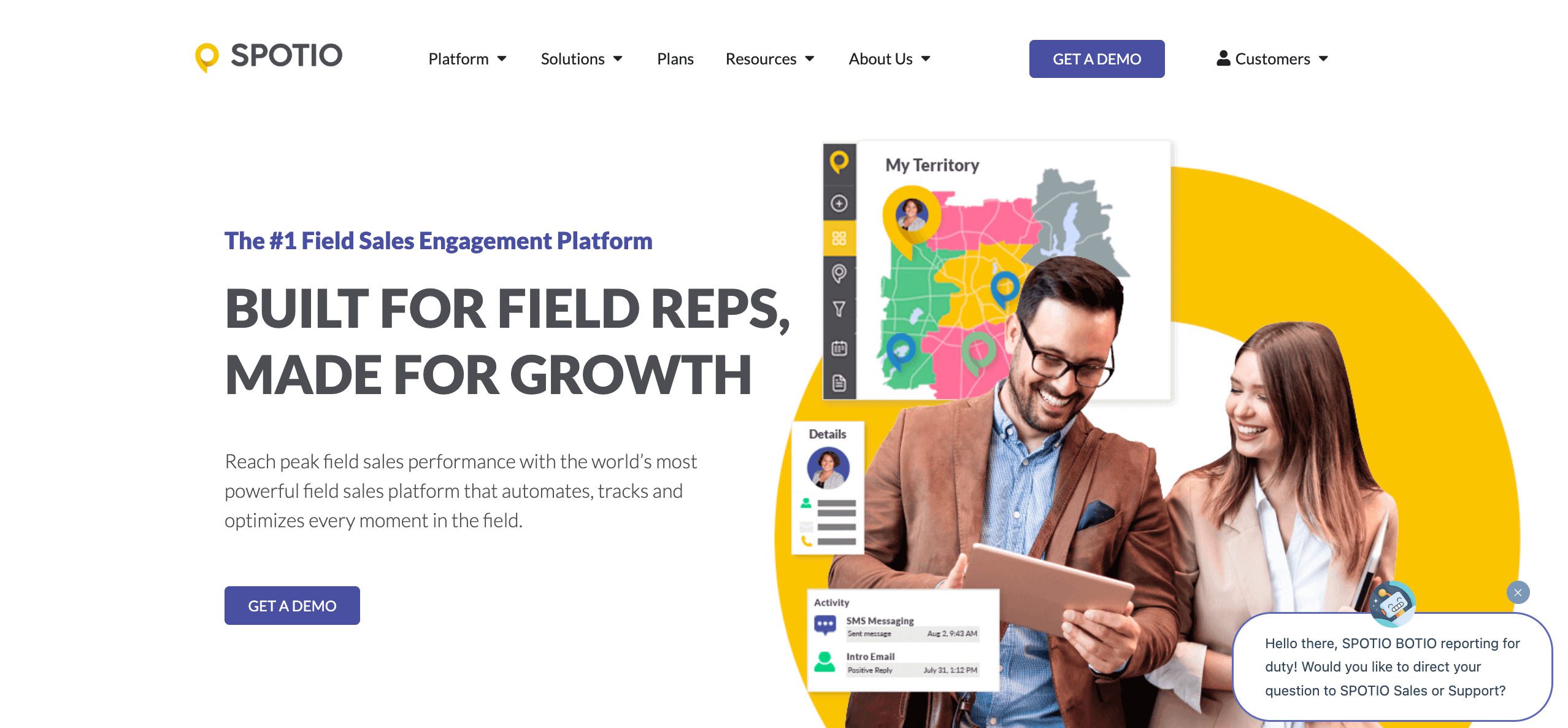
Overview and key features: Designed for field sales teams, Spotio supports canvassing, lead distribution, and territory management.
Best for: Sales-driven teams managing large field teams or canvassing operations.
Pros
- GPS tracking and sales rep dashboards
- Lead distribution and mobile check-ins
- Built for high-volume outside sales
Cons
- No project management or production tracking
- Meant to be paired with other tools
Evaluating the best roofing CRM for your needs 🧐
The right roofing CRM software for your roofing business will align all the software features with your day-to-day challenges, team size, and long-term growth plans. Let’s go over four key areas to consider before you decide.
Business size and growth goals
The best CRM for a solo roofer isn’t the same as the one needed by a 50-person roofing company. Smaller businesses often need flexibility, simple project tracking, and integrations with tools they already use, like QuickBooks. As your business scales, you’ll likely need more automation, team management, advanced reporting, and scheduling functionality. Choose a CRM that can grow with you and optimize your business along the way, not one that forces you to upgrade too soon.
Integration must-haves
Roofing CRMs should connect effortlessly with the platforms you already use. Look for tools that offer seamless integration with:
- QuickBooks for accounting and invoicing
- Specialized tools for roof measurements
- Supplier ordering systems
- Photo documentation tools like CompanyCam
- Payment platforms like Stripe or Square
Integration eliminates double entry, reduces admin time, and keeps your data in sync across jobs.
Usability and onboarding experience
A CRM is only as good as your team’s ability to use it. Prioritize user-friendly interfaces, mobile access for field staff, and strong onboarding support. Platforms like Method’s CRM features stand out for their guided setup and customizable interface, making it easy to match the system to your team’s real workflow.
Pricing and value alignment
Pricing models vary widely across the sales process. Some roofing CRMs charge a flat rate, while others scale per user or feature. The important thing is to know what you’re really getting for your money. Will the CRM save you time? Reduce mistakes? Help you win more jobs or track profitability? A good CRM pays for itself in the long run, especially when you can automate admin work and focus on growth.
Frequently asked questions
What is a CRM in roofing?
A roofing CRM (customer relationship management) is software that helps roofing businesses manage customer relationships, sales, scheduling, quotes, invoicing, and job progress, often in one central platform. It replaces spreadsheets and manual tracking with organized, automated workflows.
What is the best CRM for roofers?
The best CRM depends on your business size and goals. Method CRM is ideal for growing companies that want to customize workflows and integrate deeply with QuickBooks. AccuLynx is popular with large roofing companies. JobNimbus is known for its visual boards and mobile experience.
Do I need a CRM if I already use QuickBooks?
Yes. QuickBooks handles accounting, but it doesn’t manage leads, follow-ups, job tracking, or customer communications. A CRM like Method acts as an extension for QuickBooks by syncing estimates, invoices, payments, and customer data in real time, giving you a full picture of your business.
How much do roofing CRMs cost?
Pricing varies. Some charge per user, others use flat monthly fees. Method CRM offers flexible pricing that scales with your business. Always consider ROI based on how much time, admin work, and lost sales the CRM will help you recover.
Final thoughts and next steps 💡
If you’re still running your roofing business on spreadsheets, manual quotes, or basic accounting tools, now’s the time to upgrade. A specialized roofing CRM will streamline your entire workflow from lead capture to job completion and payment while improving your team’s visibility and your profitability.
So which CRM should you choose?
If you want a platform that’s built around your exact workflow, fully synced with QuickBooks, and supported by a team that helps you every step of the way, Method Field Services should be your top choice. It’s the flexible, scalable solution trusted by service businesses that want to grow smarter.
Ready to see it in action?
Start your free trial or book a demo with Method CRM to discover how easy it is to transform your roofing business. ✨🏠🛠️






